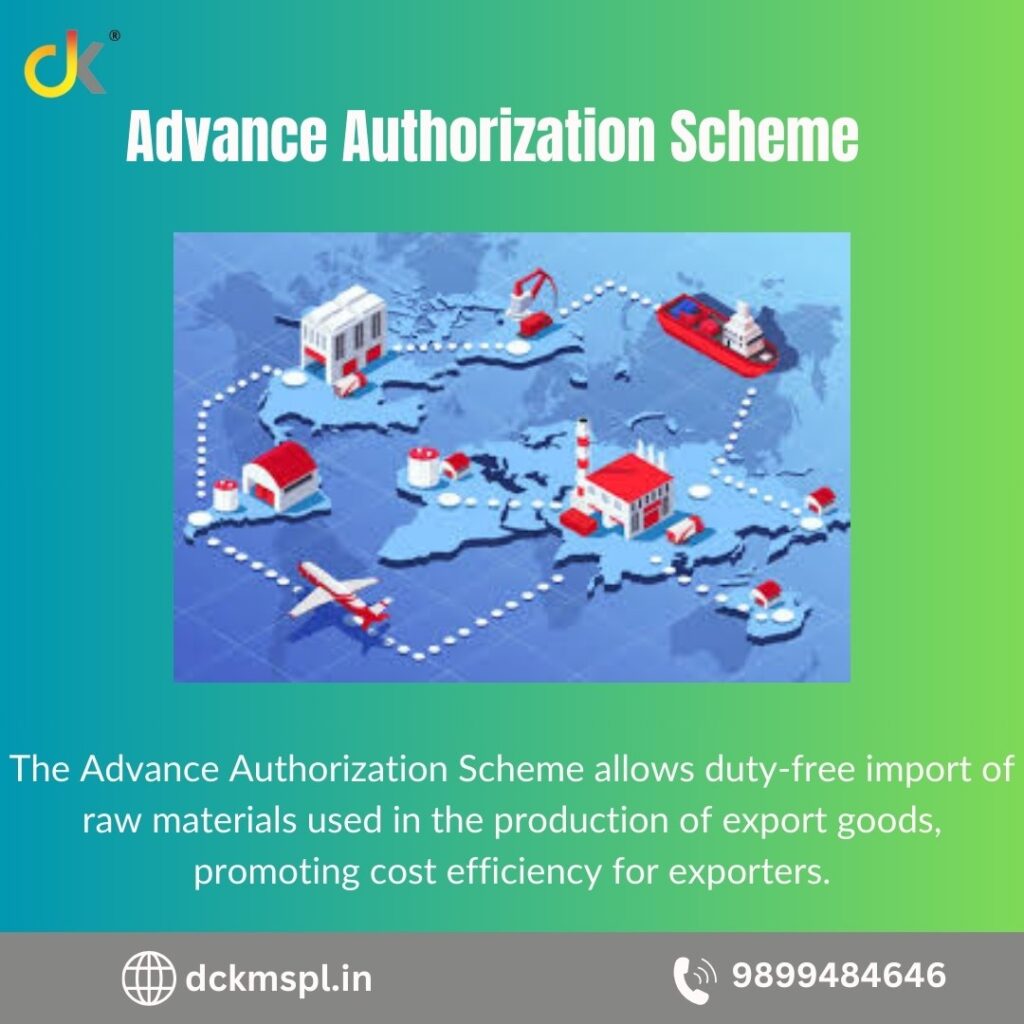The Advance Authorization Scheme (AAS) is a crucial export promotion initiative under India’s Foreign Trade Policy, designed to boost the competitiveness of Indian goods in international markets. The scheme allows duty-free import of raw materials, inputs, or components required in the manufacturing of export goods. By alleviating the burden of customs duties, including basic customs duty, additional customs duty, safeguard duty, and anti-dumping duty, it helps exporters reduce production costs and compete effectively in the global marketplace. Exporters are required to fulfill a specified export obligation, ensuring that the imported materials are used for manufacturing export goods. This scheme not only supports the ‘Make in India’ initiative but also encourages a higher volume of exports, leading to an increase in foreign exchange earnings.
Key Features of the Advance Authorization Scheme
- Duty-Free Import of Raw Materials: One of the main benefits of the scheme is the ability to import raw materials without paying any duties. The imported goods must be used for manufacturing products intended for export. This exemption includes all types of customs duties, such as basic customs duty, additional customs duty, and anti-dumping duty. By providing relief from these financial burdens, the scheme significantly lowers the overall cost of production, making Indian products more competitive in international markets.
- Transferability Restrictions: The Advance Authorization Scheme issued under this scheme is not transferable, which means that only the authorized entity can use the duty-free imports to manufacture export products. However, after fulfilling the export obligation, the raw materials imported under the authorization may be transferred with certain conditions. This helps maintain compliance with the regulations while preventing any misuse of the scheme.
- Validity and Extensions: The authorization for duty-free imports under the scheme has a specified validity period, generally 12 months from the date of issuance. The exporters are required to import the raw materials within this period. However, extensions can be granted if the exporter faces genuine reasons for delays, providing flexibility in case of unforeseen circumstances. Once imported, the products must be utilized for manufacturing the export goods and meeting the export obligation within the allowed timeframe.
Benefits of the Advance Authorization Scheme
- Reduction in Production Costs: By eliminating the need to pay customs duties on imported raw materials, exporters can significantly reduce the cost of production. This cost advantage translates into competitive pricing for export goods, helping businesses capture a larger market share in the international arena.
- Enhancing Export Competitiveness: The Advance Authorization Scheme plays a significant role in boosting the competitiveness of Indian products. With lower production costs, Indian manufacturers can offer high-quality goods at more attractive prices, which is vital for sustaining growth in the export market. This scheme, therefore, acts as a catalyst for expanding export volumes and diversifying market reach.
- Flexibility in Sourcing Raw Materials: The scheme allows exporters to source raw materials from both domestic and international markets. If the raw materials are not available domestically, companies can import them duty-free under the Advance Authorization. This flexibility ensures that exporters are not limited by local supply constraints and can maintain steady production to meet global demand.
Procedure to Avail the Advance Authorization Scheme
- Issuance of Advance Authorization: Upon approval, the DGFT issues an Advance Authorization, allowing the applicant to import the specified quantities of raw materials duty-free. The authorization is subject to certain conditions, such as the export obligation period and the validity of the authorization.
- Fulfillment of Export Obligation: After importing the raw materials, the exporter must fulfill the export obligation by exporting the specified quantity and value of goods within the designated period. If the exporter faces difficulties in meeting the obligations, an extension may be granted upon request.
- Monitoring and Compliance: The DGFT closely monitors the scheme to ensure compliance with the conditions. Exporters must maintain records and provide documentation as proof of fulfilling the export obligation to avoid penalties.
Conclusion
The Advance Authorization Scheme is a valuable tool for enhancing the competitiveness of Indian exports. By reducing production costs through duty-free imports, it helps businesses in various industries achieve better profit margins and expand their global presence. Through its structured framework and export obligations, the scheme also ensures that the benefits are effectively utilized to boost India’s foreign trade.The advance authorization scheme covers various industries, including textiles, engineering, and chemicals, offering flexibility in sourcing raw materials. With a validity period for imports and extensions available under certain conditions, the scheme supports exporters in meeting global demand while maintaining compliance with regulatory requirements.
